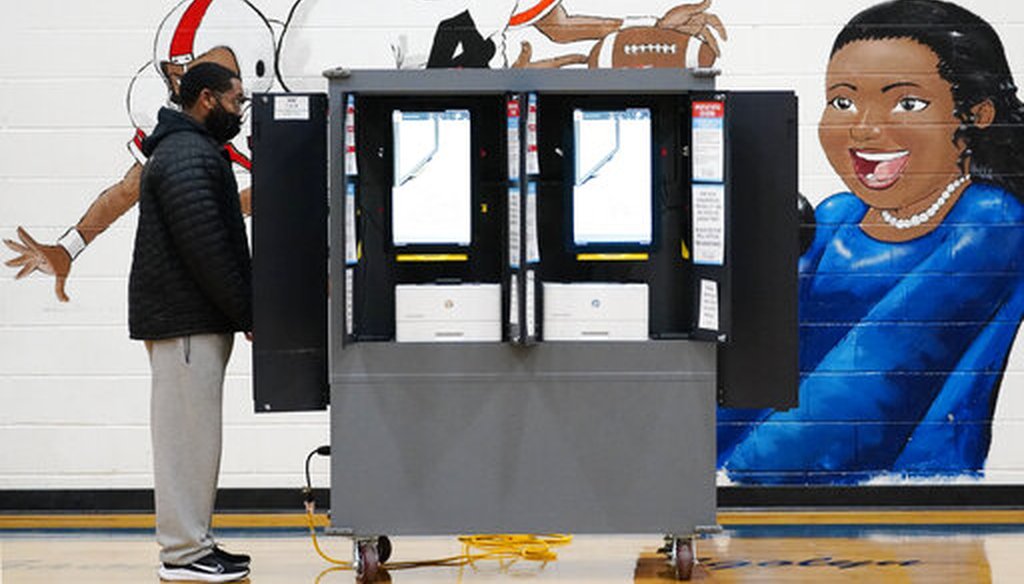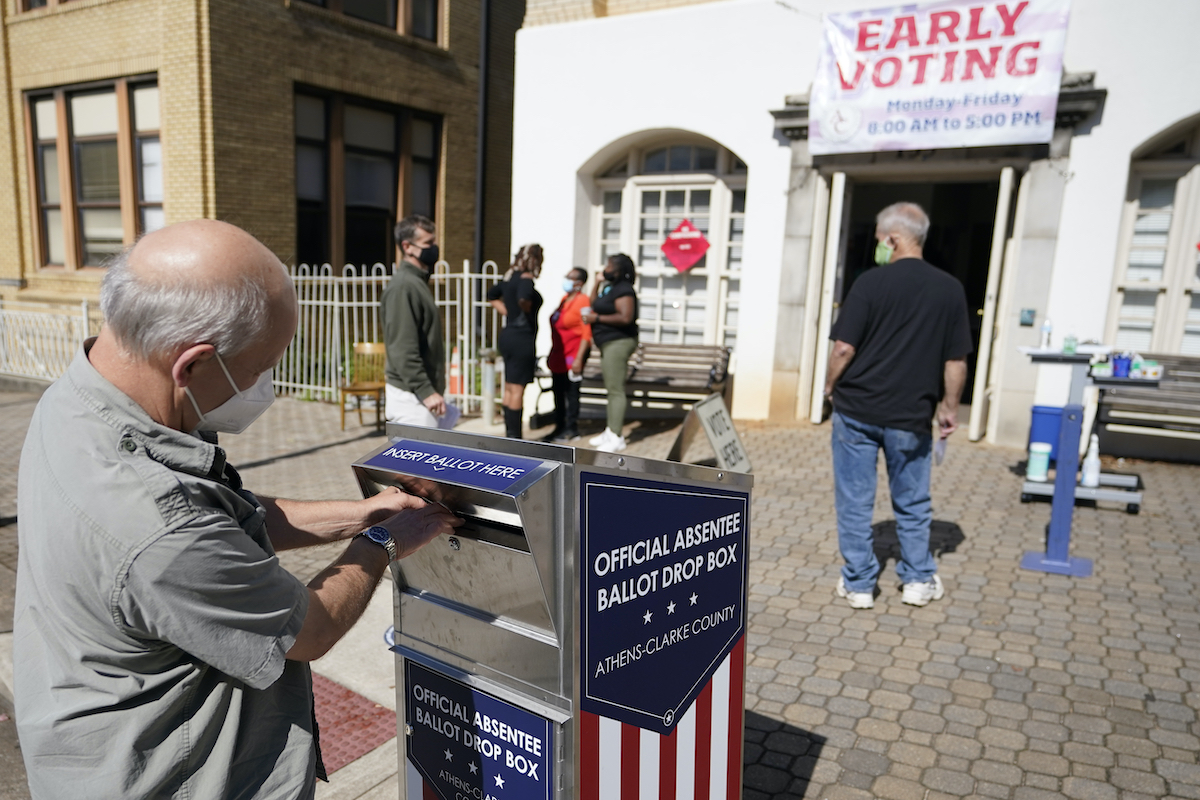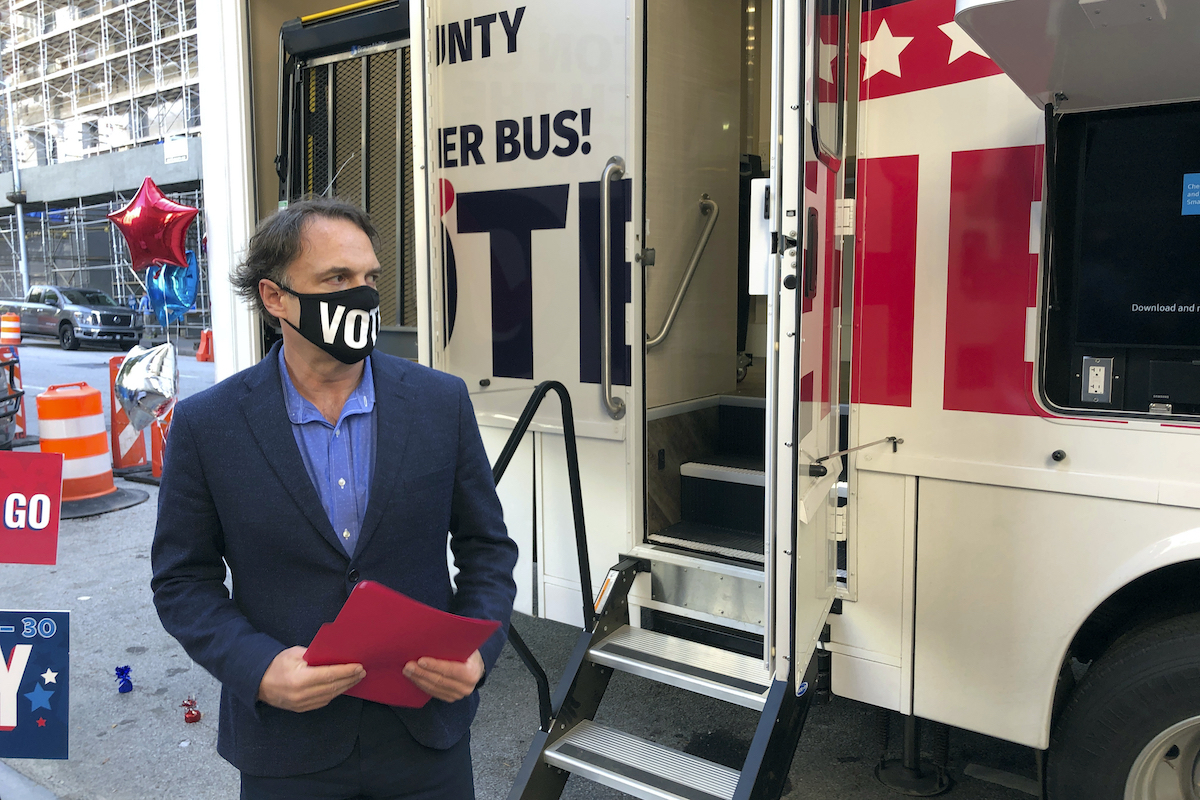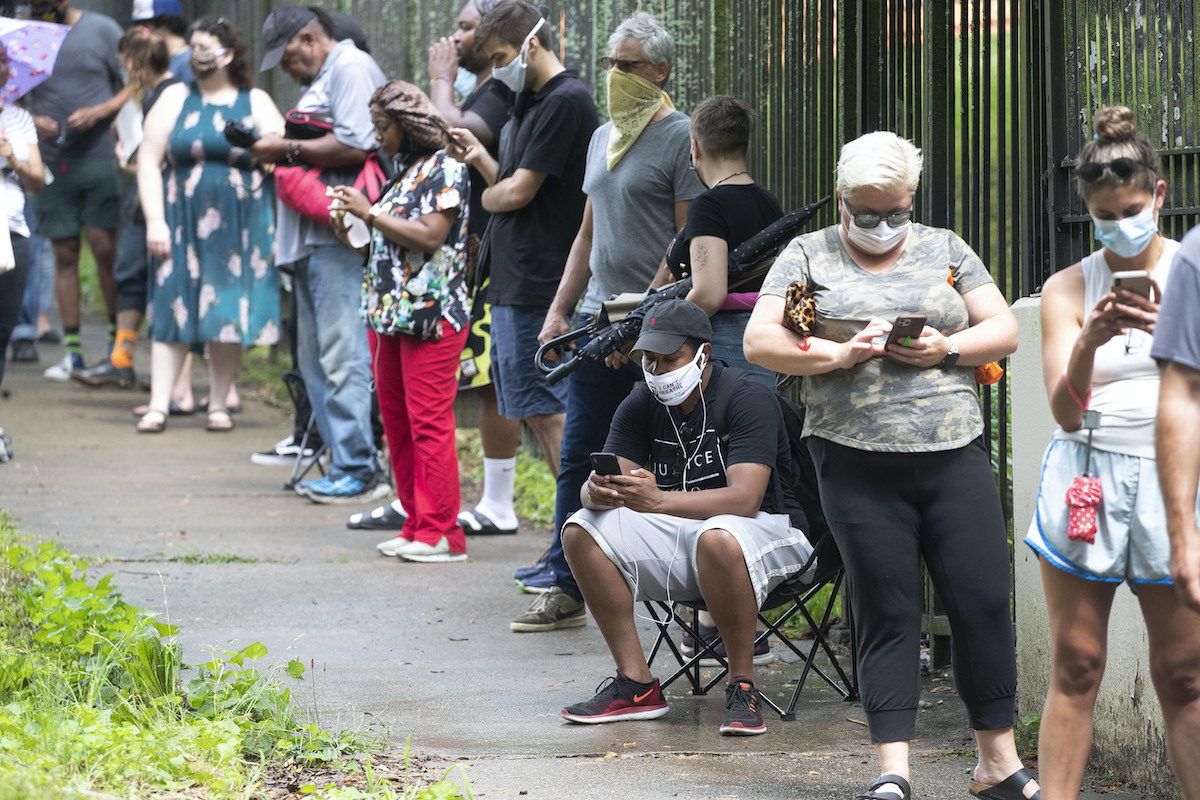Stand up for the facts!
Our only agenda is to publish the truth so you can be an informed participant in democracy.
We need your help.
I would like to contribute

A person casts their vote during Georgia's Senate runoff elections on Tuesday, Jan. 5, 2021, in Atlanta. (AP)
If Your Time is short
-
Major League Baseball pulled the All-Star Game from Atlanta after state Republicans passed a new law, nearly 100 pages long, that includes a series of voting changes.
-
The law changes voting by mail in ways that could reduce access, such as limiting the number of ballot drop boxes and curtailing the length of time voters can use them.
-
But the law also expands early voting access, and makes Sunday early voting an option for counties. It’s likely that the large, urban counties will choose to offer Sunday early voting as they did in 2020.
Georgia’s new voting law has ignited a fight over whether the law expands or shrinks access to the ballot. Republican lawmakers changed voting rules after Democrats won 2020 and 2021 statewide races thanks to strong turnout among Black voters.
A few major corporations broadly attacked the law, but the most significant action came from Major League Baseball, which pulled the All-Star Game from Atlanta. The league said in an April 2 statement that it "opposes restrictions to the ballot box."
Republican Gov. Brian Kemp, who signed the bill into law in March, said that Major League Baseball’s conclusion about the bill was wrong, and that the bill expands ballot access and ensures election integrity.
Critics of the law, including voting rights activist Stacey Abrams, said the bill is "Jim Crow 2.0" and will make it harder for people of color to vote.
The law’s controversial nature is due in part to the fact that Georgia ran a secure and orderly election in 2020, but supporters still falsely claimed the vote was rigged.
Sign up for PolitiFact texts
"Georgia ran a model election for the nation — as secure, transparent, accessible as any election you could hope for — and Georgia did this in the middle of the pandemic," said David Becker, executive director of the Center for Election Innovation & Research. "Georgia did not need election reform after this election. In fact, other states might want to look at what Georgia did in 2020 and try to model themselves a little more after them. The only reason any kind of reform was being considered was because of the big lie, the idea that something was wrong in this election when in fact it was incredibly transparent and secure."
We reviewed the substance of the law and spoke with experts about its impact. The long and complicated piece of legislation has both the potential to expand voting as well as restrict it.
"It’s just a clear mixed bag," said Matthew Weil, an elections expert at the Bipartisan Policy Center. On the positive side for voters, the law provides for more early voting. (An earlier version of the bill sought to get rid of Sunday voting but didn’t become law.) On the negative side, added identification requirements for absentee voting will likely restrict access.
The effects of other provisions, including changes to the State Election Board, are difficult to predict, because much will depend on how officials apply them.
What the law means for absentee voting by mail
Georgia will remain one of the majority of states that allow voters to obtain absentee ballots without an excuse. But the law adds several rules related to voting by mail that could create obstacles for some voters. One of the most significant obstacles is changes to ballot drop boxes that will make them far less convenient for voters.
The state election board added drop boxes in 2020 as an emergency rule during the pandemic. The new law makes drop boxes part of state law but restricts their availability. The law says all counties must have at least one drop box but can only add more if it adds up to one drop box for every 100,000 registered voters or the number of early voting locations there are in the county. The New York Times found the new law would allow 23 drop boxes for the four counties that make up metro Atlanta, compared to the 94 those counties offered combined in 2020.
The law also restricts use of drop boxes to early voting hours, which renders moot a reason why some voters use them: to turn in ballots late at night, or after the early voting period has ended. State lawmakers also banned mobile voting buses, which Fulton County used in 2020.
Other provisions reduce the time period to seek an absentee ballot. Voters can start requesting an absentee ballot 11 weeks before an election, rather than the current 25 weeks. An application for an absentee ballot must be received no later than 11 days before election day, while in 2020 voters had until the Friday before Election Day.
Voters applying for absentee ballots must provide the number of their Georgia driver's license or identification card or a copy of another form of identification. According to Fair Fight Action, about 200,000 Georgians do not have an ID, which represents about 3% of voters. Previously the law required election officials to match voters’ signatures on the absentee ballot envelope with their signature on record.
The new law bans election officials from sending out mass applications for absentee ballots. Previously the law was silent on this practice, so some jurisdictions sent out applications, said Keith Williams, general counsel to the Georgia’s Republican Speaker of the House David Ralston.
The law states that election officials shall mail absentee ballots not more than 29 days before an election, shrinking that from the previous 49 days.
What the law means for in-person voting and waiting in line
The new law now requires 17 days of early voting, but provides the option of 19 days. The state used to require 16 days.
Previously, counties had to offer one Saturday of early voting and had the option to provide an additional Saturday and two Sundays, for a total of four weekend voting days. Generally larger, diverse Democratic-leaning counties were the ones that chose to offer up to four weekend days of early voting. That means that the early voting provisions likely mean the status quo in the larger counties.
The new law now mandates two Saturdays of early voting and makes the two Sundays optional. The Sunday voting can fall on either the second or third Sundays before Election Day. (Georgia election law did not previously allow Sunday voting on the Sunday directly before Election Day.)
This means that in smaller counties that previously only offered one Saturday of early voting, there will now be at least one second Saturday, whereas voters in counties that already offered four days of early voting will essentially operate under the status quo. Voting will take place from 9 a.m. to 5 p.m. with the option of expanding the hours to 7 a.m. to 7 p.m.
U.S. Sen. Charles Schumer, D-N.Y., said that "Republicans recently passed a bill to eliminate early voting on Sunday" in Georgia. We rated his statement Mostly False. Georgia Republicans initially proposed getting rid of Sunday early voting but backtracked following criticism.
Join PolitiFact LIVE on May 10-13 for a festival of fact-checking with Dr. Anthony Fauci! Register today >>
Kemp said that Biden had told "repeated lies" about the new law, a reference to Biden’s statements about the hours polls will be open. Biden said in remarks from the White House that the Georgia law will "end voting at five o’clock when working people are just getting off work." Biden didn’t specify if he was referring to election day or early voting, but his statement is wrong as it pertains to Election Day. The law keeps Election Day hours of 7 a.m. to 7 p.m. unchanged. For early voting, some counties will likely stick with the minimum standard of ending voting at 5 p.m., but large counties will likely use the option of extending those hours to 7 p.m.
Democrats have criticized the provision that bans giving away water or food to voters within 150 feet of a polling place or within 25 feet of any voter standing in line. Voting rights groups have routinely organized such handouts to voters in line, particularly in urban areas where research shows that lines are longer in nonwhite areas.
The law attempts to reduce the chance that voters will wait in long lines. It states that if in a previous general election, a precinct contained more than 2,000 voters and they had to wait in line for more than one hour, election officials either have to reduce the size of the precinct or increase the amount of equipment and poll workers.
Changes to the State Election Board
One of the most hotly debated parts of the law pertains to the power given to the State Election Board to review the performance of local elections officials and suspend them. Democrats fear that this would mean removal of officials in Democratic strongholds such as Fulton County, a jurisdiction with a history of election administration problems. State and local election officials have engaged in finger-pointing over who was to blame for long lines or other problems.
But the law set specific criteria for the board to remove local officials. The law says that to initiate a suspension requires that a review find that the election official has committed at least three violations of elections law or rules in the last two election cycles without remedying the violations or "by clear and convincing evidence, the county or municipal superintendent has, for at least two elections within a two-year period, demonstrated nonfeasance, malfeasance, or gross negligence in the administration of the elections."
A Democratic PAC, Meidas Touch, suggested this could lead the board to essentially overturn results. But the law doesn’t state that, and such arguments are based on hypothetical scenarios. Georgia Public Radio’s Stephen Fowler said that the group was wrong: "Local elections boards do a lot of things — like yes, certify election results — but a temporary superintendent can’t necessarily invent new results, and the legislature isn’t involved in this process."
Any efforts to replace an elections official and thwart certification or counting of votes would likely land in court.
"Those who believe the state board could step in and overturn an election are engaged in a bit of fear mongering," said Charles Bullock, a political scientist at the University of Georgia. "If you are simply trying to pluck victory out of thin air, the court is going to strike that down."
But the board clearly gives state Republicans more power. The board will no longer be chaired by the secretary of state. That change is a swipe at Republican Secretary of State Brad Raffensperger, who concluded the Georgia election was secure in the face of criticism by then President Trump. Instead, the GOP-dominated General Assembly would appoint a chair of the five-member board. The law includes efforts to make the chair nonpartisan — it says the chair can’t have been a candidate in the preceding two years. But it still gives the General Assembly the power to appoint the majority of the board.
We can’t say for certain how the board will apply the law in future elections, but election experts say this is a provision they will keep an eye on.
"The changes to composition of the State Election Board and the board’s ability to replace county election officials could be abused," said Becker of the Center for Election Innovation & Research. "But this is something we are going to continue to watch, because it also might not be abused."
RELATED: Georgia voting law does not make it a crime to drop off grandma’s ballot
RELATED: The facts about Georgia’s ban on food, water giveaways to voters
Our Sources
Major League Baseball, MLB statement regarding 2021 All-Star Game, April 2, 2021
Georgia Gov. Brian Kemp, Governor Kemp, Speaker Ralston Issue Statements on MLB All-Star Game, April 2, 2021
Georgia SB202, 2021
Georgia Public Radio, What Does Georgia's New Voting Law SB 202 Do? March 26, 2021
Georgia Public Radio reporter Stephen Fowler, Tweet, March 27, 2021
Georgia Public Radio, Here Are All The Lawsuits Challenging Georgia's New Voting Law, Updated April 2, 2021
Stacey Abrams, Tweet, April 2, 2021
Esosa Osa, Fair Fight Action research and policy director, Tweet, April 3, 2021
Atlanta Journal-Constitution, Sweeping changes to Georgia elections signed into law by Gov. Brian Kemp; March 25, 2021
Atlanta Journal-Constitution, Bill could shift election power to GOP officials, March 25, 2021
New York Times, What Georgia’s Voting Law Really Does, April 2, 2021
Perry Grossman, Senior Staff Attorney in the Voting Rights Project at the New York Civil Liberties Union, Twitter thread, April 2, 2021
Washington Post, Georgia sports teams and major companies such as Coca-Cola and Delta Air Lines condemn new state voting law, March 31, 2021
National Conference of State Legislatures, Voting Outside the Polling Place: Absentee, All-Mail and other Voting at Home Options, Sept. 24, 2020
Fulton County, Mobile voting unit, 2020
PolitiFact, The facts about Georgia’s ban on food, water giveaways to voters, March 29, 2021
Email interview, Keith Williams, General Counsel – office of the Speaker of the House, April 4, 2021
Email interview, Ari Schaffer, Georgia Secretary of State Brad Raffensperger spokesperson, April 4, 2021
Email interview, Mallory Blount, Gov. Brian P. Kemp spokesperson, April 4, 2021
Email interview, Seth Bringman, Fair Fight Action spokesperson, April 4, 2021
Email interview, Chris Meagher, White House spokesperson, April 4, 2021
Email interview, Rick Hasen, a law professor at the University of California, Irvine, April 4, 2021
Email interview, Charles Bullock, University of Georgia political science professor, April 4, 2021
Telephone interview, David Becker, executive director of the Center for Election Innovation & Research April 4, 2021
Telephone interview, Matthew Weil, director of Bipartisan Policy Center’s Democracy Project, April 5, 2021








































